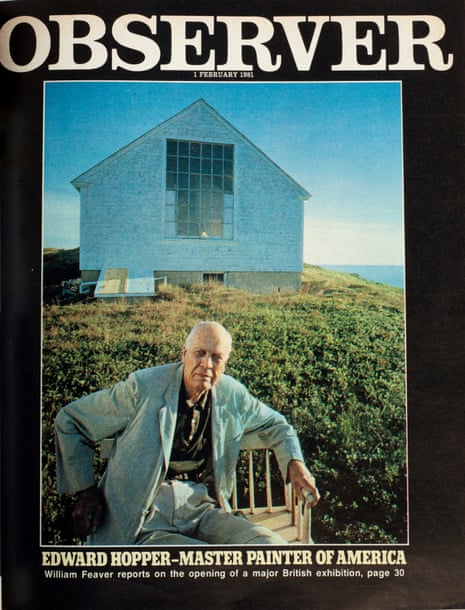To mark the first major exhibition in London of Edward Hopper’s art, 14 years after his death, the Observer’s then chief art critic William Feaver wrote an overview of his life and work (‘Master painter of America’, 1 February 1981).
Today, Office at Night, one of Hopper’s best known paintings, has an even more melancholic air – at least for anyone who actually misses the office. ‘The picture was probably first suggested by many rides on the L train in New York City after dark,’ said Hopper, ‘and glimpses of office interiors that were so fleeting as to leave fresh and vivid impressions on my mind. My aim was to give the sense of an isolated and lonely office interior rather high in the air.’ Addressing the noirish atmosphere, Feaver wrote: ‘Everything… is tense and, by implication, expectant: typewriter, phone, chair, half-open door, half-closed blind.
‘Hopper’s America is a land of lonely streets and heartbreak hotels,’ he continued. ‘The sun beats down on the naked city. Night falls, business slackens. Only the lonely are left, whiling away the small hours in bars and diners that, from the outside, look like fish tanks stocked with drab species.’
Hopper himself said that ‘the loneliness thing is overdone’, but Feaver argued that it was a sort of romanticism. ‘Hopper worked slowly, composing, rearranging, reconsidering. What emerged, in his most memorable paintings, was a prolonged stillness… a cinematic quality… In Early Sunday Morning, [featuring a row of New York shop fronts] the titles are about to appear: “Edward Hopper Presents…”’
Feaver concluded that ‘Hopperdom is a state of mind, an expression of wonder. “What I wanted to do,” he once remarked with artful simplicity, “was paint sunlight on the side of a house.” What he expressed was an appreciation of the extraordinariness of life and sadness at what we fail to make of it.’
